Based on the needs of teachers, school leaders, and system leaders,
I can customise workshops and keynote addresses on topics ranging
from differentiated learning, and underachievement of gifted learners
to fostering creativity and developing entrepreneurial mindsets.

The workshops and keynotes are grounded in research-based, data-informed practices; and are focused on the pedagogy of talent development. The following are a sample of some of the workshops that I provide.
Creating Innovators: The Art of Awakening Wonder
One of the fundamental goals of 21st century learning for young people is fostering entrepreneurial mindsets through innovation education. Building innovative mindsets is about developing a critical mix of success-oriented attitudes of initiative, intelligent risk taking, collaboration, opportunity recognition, and capacity for “design thinking”. Through an exploration of research-based case studies of gifted learners and a Learner-centred Innovation Pedagogy Framework, we are able to construct a deeper understanding of what it means to innovate, and what we must do to ensure that the young learners are “innovation ready”. Research and evidence-based practical teaching strategies for creativity and innovation education across the curriculum at whole school and classroom levels will be shared.
Topics include
- Fostering innovation education through problem-based, multidisciplinary, collaborative learning
- Understanding the Learner-centred Innovation Pedagogy Framework
- Identifying real-world problems in wonder-rich classrooms
- Implementing innovation projects using “design thinking” process (i.e., empathise, define, ideate, prototype, and test)
- Using action learning for “inter-thinking” between teachers and students
- Building a culture of prototyping for solving problems
- Seeking feedback and refining the design
- Pitching the design and building partnerships
- Developing problem-finders, innovators, and entrepreneurial mindsets
Developing Differentiated Assessments
The workshop assists educators in developing differentiated assessments to meet the needs of diverse learners. Practical strategies for developing pre-assessments, formative assessments, and summative assessments are shared in this workshop. The hands-on activities assist participants in developing valid, reliable, and useful assessments about student learning to monitor student progress, promote active student engagement, provide ongoing feedback to students, and guide future teaching and learning opportunities.
Topics include
- Exploring the difference between norm-referenced and criterion-referenced assessments
- Characteristics of performance assessment
- Creating differentiated assessments, including pre-, formative, and summative assessments
- Developmental taxonomies for creating performance assessments (e.g., Revised Bloom’s Taxonomy, The SOLO Taxonomy, Dreyfus’s Model, Guilford’s FFOE Model, and Krawthwohl’s Taxonomy of the Affective Domain)
- Guidelines for writing quality criteria for assessments
- Anatomy of rubrics
- Formative feedback at task, process, and self-regulation level
- Practical steps for designing quality assessments for quality learning
Developing Creative Mindsets: The Art of Looking Sideways
The workshop demonstrates that the role of imagination is at the heart of creative learning. Activities that foster creative thinking should challenge gifted learners to think laterally, be open-minded, inquire into possibilities and kindle their imagination. Significantly, schools need to promote creativity across all areas of curriculum. Practical strategies for implementing the Learner-centred Creative Pedagogy Framework in schools are shared in this workshop.
Topics include
- Exploring the concepts of imagination, creativity, and innovation
- Understanding the Learner-centred Creative Pedagogy Framework
- Developing divergent questioning skills
- Using creativity tools such as FFOE (fluency, flexibility, originality, elaboration), SCAMPER, and Synectics
- Creative problem solving
- Building creative habits of mind
- Assessing creativity using success criteria
Differentiated Learning in Classrooms
Learner-centred differentiation is about honouring each student’s learning needs, interests, and readiness by modifying learning outcomes, content, teaching strategies, products, and learning environment to maximise each student’s learning outcomes.
Topics include
- Gaining a general overview of differentiated learning
- Exploring the elements of a differentiated classroom
- Understanding the Learner-centred Differentiated Learning Framework
- Using pre-assessments and assessing student readiness, interests, and learning profiles
- Differentiating learning outcomes, content, process, products, and learning environment
- Using formative and summative feedback
- Employing self, peer, and teacher evaluations
Leading Differentiated High Performance Learning in Schools
Effective school leaders innovate whole school change by creating conditions that lead to differentiated high performance learning among staff and students.
Topics include
- Exploring your school context, and setting the stage for leading change toward differentiated learning
- Examining the nature of staff professional development for differentiated learning
- Leadership actions to promote, implement, and sustain differentiated learning
- Monitoring and evaluating the change process
- Building leadership density by empowering teacher leadership
- Generating short-term wins and building a culture of success
- Developing a culture of ongoing reflection
- Embedding changes into the school culture
Concept-based Learning
Intellectual development has to be a major educational focus if we are to prepare our young people for the complexities of 21st century living. The ability to transfer knowledge and skills to new or similar contexts fosters deeper understanding and conceptual levels of thinking that are critical to the intellectual development.
Topics include
- Concept-based learning and the thinking classroom
- Understanding the structure of knowledge
- Scaffolding conceptual understanding
- Differentiating concept-based learning
- Designing concept-based units and lessons
- Delivering concept-based instruction
- Building communities of practice
Other workshop topics include:
- Leading 21st century learning and building collaborative cultures
- Design Thinking for Gifted Learners
- Creating Innovation Ecosystem – Imagination, Creativity, Innovation, and Entrepreneurship
- School and System Leadership for High Performance Learning
- Engaging Wonder in Everyday Classrooms
- Gifted Underachievers – Identification and Strategies for Achievement
- Perfectionism or Pursuit of Excellence? – Promoting Autonomy and Motivation
- Affective Differentiation Models – Practical Implications
- Developing Entrepreneurial Mindsets
- Student Voice: Teachers and Students as Pedagogical Partners
- Student Motivation and Engagement
The core purpose of education is to turn mirrors into windows.
– Sydney J. Harris (1917-1986)

Recent Comments